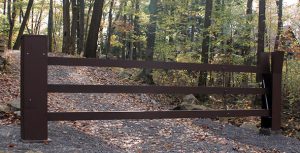In the event of a waiver of easement due to lack of interest, the interests of the owner of the serving inheritance do not play a role. In this blog we take a brief look at what these concepts mean and what this means in practice.
Servitude
If an inheritance is entrusted with a right of way, there is an easement for the benefit of another inheritance. This other inheritance is also referred to as the ‘prevailing inheritance’, while the inheritance entrusted with this right is referred to as the ‘serving inheritance’. It comes down to the fact that the owner of the serving estate must allow the owner of the prevailing estate to make use of the serving estate in a certain way. The right of way is by far the most common form of easement, but other forms are also possible.
Servitude may arise through establishment, but also through prescription. In the case of settlement, the owners of the heirs make an appointment for certain use and then have it notarized. In the case of prescription, if someone uses someone else’s property in a certain way for 10 or 20 years, a servitude may arise.
Cancellation of easement
If a yard is in charge of an easement, this sometimes affects the value of the yard or the way in which the owner of the yard experiences his property. It is for this reason that it often happens that the owner of a serving estate tries to have the easement waived. This is possible, for example, if the interest in exercising the easement has lapsed. For example, it may be that the owner of the prevailing courtyard now has a different route over his own courtyard at his disposal.
But suppose the owner of the serving estate also has an interest in waiving the easement? For example, because a new owner of a (serving) farmyard has project development in mind. Do these interests play a role in case of dissolution due to lack of interest? No, the Supreme Court ruled in 2014 that the interests of the owner of the serving estate (except for misuse of powers) do not play a role. It merely concerns the interest of the prevailing inheritance in the exercise of the servitude of the inheritance.
Case study
On top of that, the importance of the prevailing inheritance is assumed fairly quickly. This was also the case in a recent Supreme Court judgment. The owner of the prevailing estate had established a road easement, which means that he may use his neighbour’s plot of land to reach the public road. Originally, the owner of the dominant estate did not have his own way out to the public road, but in the meantime the situation had changed and he had. However, to reach this new road he had to make a considerable detour. This fact was of sufficient weight for the Supreme Court to assume that he (still) had a reasonable interest in exercising the easement. Now it has to be said that in this case the owner of the prevailing estate had to make a detour of several kilometres. It would be interesting to see to what extent the Supreme Court sees it differerently if the distance is considerably shorter.
Are you the owner of a serving courtyard and would you like to have a servitude abolished or would you like to establish a servitude? Please feel free to contact M2 Advocaten.
Lawyer Marius Rijntjes (rijntjes@m2advocaten.nl)

